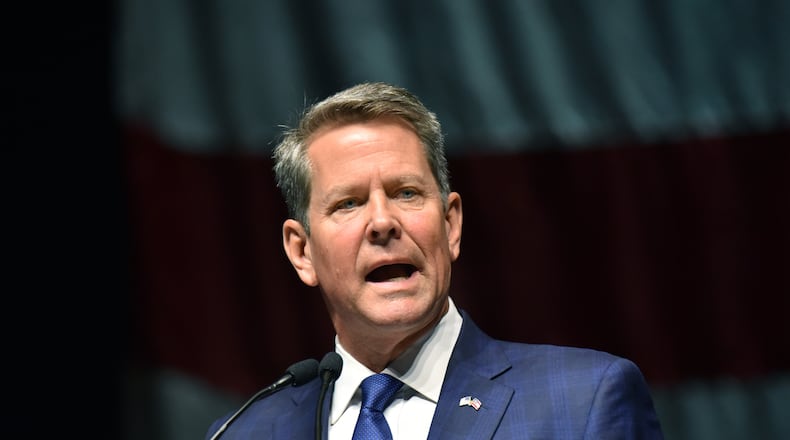There's often a difference between what a politician says and what their aides wants them to say. And a document obtained by The Atlanta Journal-Constitution offers a glimpse of that gulf.
At a Rotary Club of Atlanta meeting in April, Gov. Brian Kemp broke his pointed silence about the effort to give the state control of the city's bustling airport, saying that "sometimes you can be thankful, as Georgians, that nothing actually happened."
That’s not exactly what his advisers wanted him to say. They drew up a memo of responses to potential questions he could receive at the meeting, one of his first public events after the end of the session. One of them was this query:
“Do you think the state of Georgia should take over, or oversee, the Atlanta airport operations?”
That question, indeed, was posed during that meeting, and Kemp talked about the need to be "very cautious" about such legislation - and the likelihood that it would emerge again next year.
In the notes his staff drafted, the response was more direct.
“This outcome arrived at the expense of my administration’s jet fuel tax legislation, which would’ve greatly improved our tax environment for our airlines and sent critically needed resources to rural airports across the state,” read the memo.
“However, I didn’t support the takeover – and I believe Mayor (Keisha Lance) Bottoms will keep working to improve transparency in the city’s operations at the airport. There are existing checks and balances; there can be more; I am confident that the mayor will do what is right for our state.”
The memo included a potential follow-up in case the crowd of business executives pressed him about the federal probe into airport contracts: "Are there actions that the city could take to resolve some of the lingering concerns regarding transparency and procurement at the airport?"
“As I said, I am confident that the mayor will do what is right,” read the memo. “She has pledged to make changes, and I believe that she will do everything that she can to uphold this promise to her constituents.”
The takeover measure wound up getting smushed onto two other measures near the end of the session in what became known as the "Frankenbill" – a jet fuel tax break that would have benefited Delta Air Lines and other air carriers, and a rural transit mobility push. All three failed this year due to infighting.
(Kemp was particularly miffed about the jet fuel incentive, which stalled amid Senate objections despite his personal lobbying of GOP lawmakers. He said at the Rotary the issue shouldn't have been "controversial" but became more toxic when it got bound together with the airport issue.)
The takeover effort's Republican supporters say the switch is needed to protect the state's economic engine from corruption and mismanagement, and pointed to the ongoing federal corruption probe that has netted several high-profile indictments.
Critics, including Bottoms and most Democrats, say the airport has become the world’s busiest, and one of the most efficient, under Atlanta’s oversight. And they say any takeover attempt will jeopardize the airport’s finances and trigger a wave of litigation.
Credit: Alyssa Pointer/alyssa.pointer@a
Credit: Alyssa Pointer/alyssa.pointer@a
***
Although the anti-abortion "heartbeat" law didn't come up during that particular meeting, it has surfaced plenty since then.
His staff prepared him for a potential question that touched on the abortion restrictions by asking whether he would “support legislation next year that could put Georgia back into the national spotlight.”
The suggested answer outlined in the memo largely tracks with what he’s said publicly. Among the talking points:
- "I'm not afraid to tackle tough issues, and I will keep my promises to the people who elected me. They knew where I stood on this issue, and they agreed with me."
- "I will always stand up for the vulnerable – for the people who cannot speak up for themselves."
- "As a state, we should not set aside our morals and values or compromise on who we are."
- "Our capital city is the City Too Busy to Hate. I believe that our state is too busy to hate, and our priorities clearly reflect that."
About the Author
The Latest
Featured





